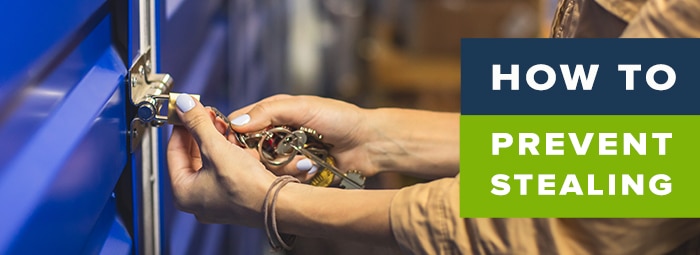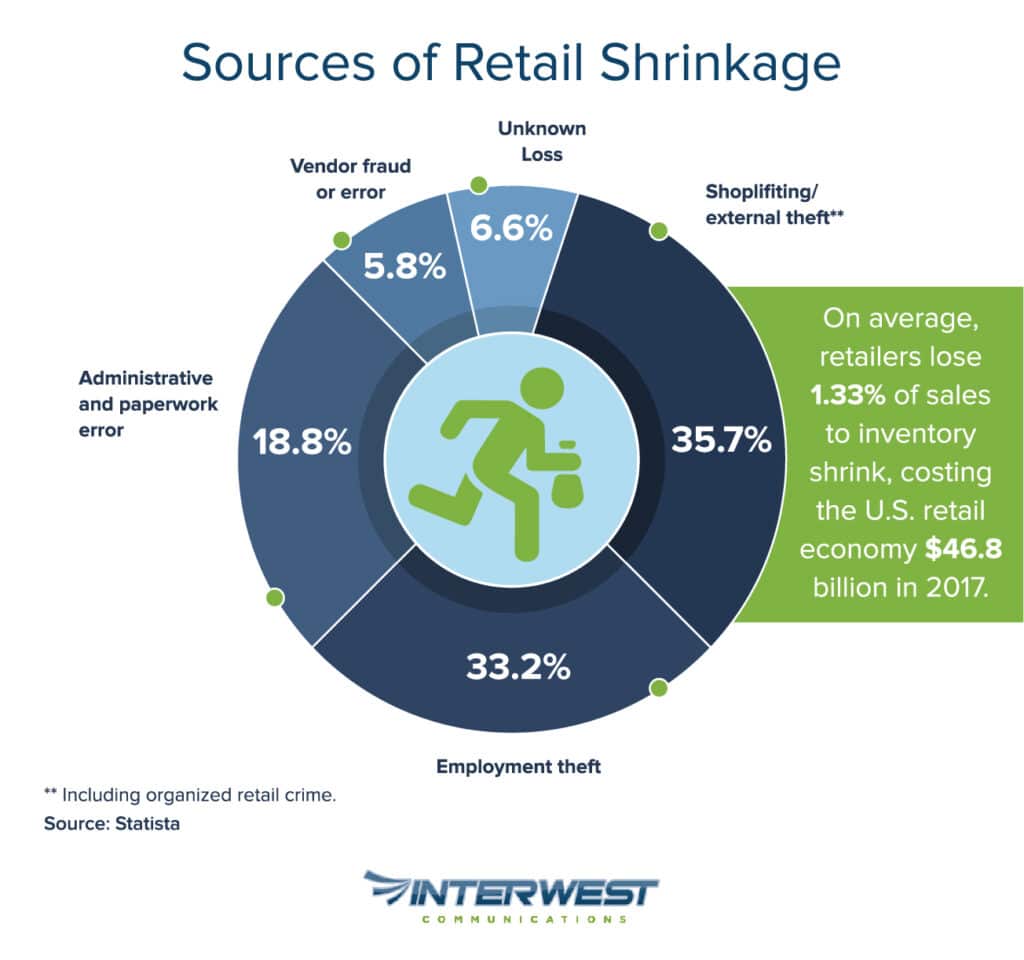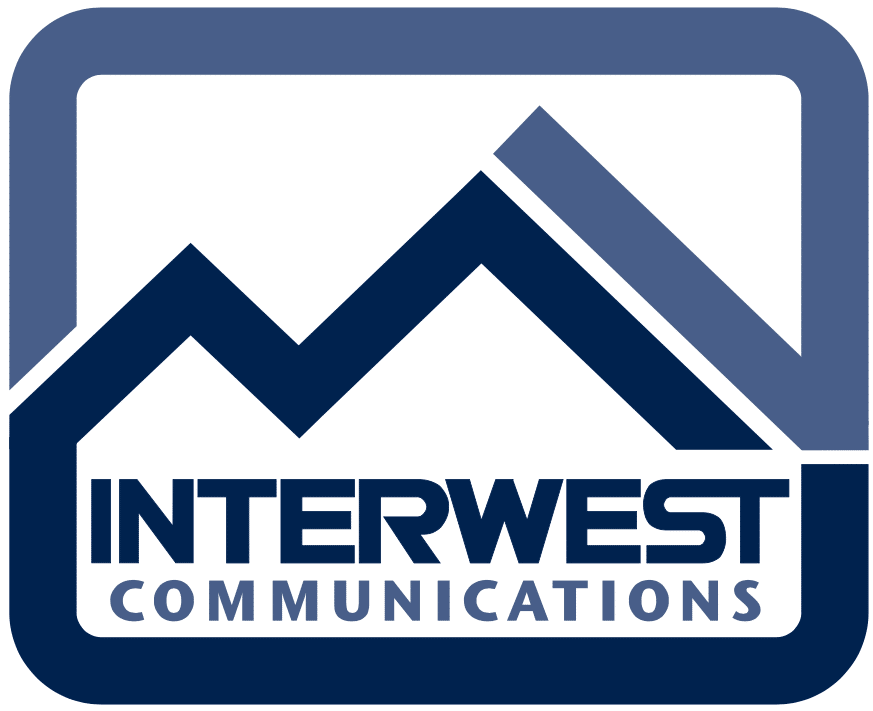- May 1, 2025
- Posted by: Interwest Communications Team
- Categories: News, Uncategorized

Originally posted on September 15, 2022 @ 11:03 pm
How to Prevent Stealing
It’s happened to everyone at some point: someone walks into your store and takes an item without paying for it. It’s theft and it’s illegal, but that doesn’t make it any less of a hassle for business owners to deal with. You don’t want to let a few bad actors ruin your business revenue, however. Preventing theft is easier than you think.
According to the NRF (National Retail Federation), retail losses in the form of shrinkage were over $61.7 billion. This number represents expenses related to shoplifters, unjustified chargebacks, embezzlement, fraud, and internal theft. Most of these losses are preventable — with a few precautions, you can protect your business from theft.
External Losses
Before you can identify what type of theft is occurring in your store, you need to know how much money has been lost. This will help you determine if there are any patterns or trends that can be used to help prevent future losses.

Here are some common ways thieves steal from retailers:
Shoplifting: Thieves who shoplift tend to steal small items that they can easily conceal, like jewelry and clothing. The most common way thieves shoplift is by swapping high price tags with lower ones. This is called tag swapping and can often occur when a customer has placed an item back on the shelf and swapped price tags or barcodes with cheaper items. Thieves also shoplift by placing items in their purses or bags, which may not set off alarms in the store’s security system.
Fraudulent returns: Thieves who try to return an item they did not purchase or make false claims to get their money back are known as fraudulent returners. This type of loss occurs when someone attempts to return an item after having already stolen it from another retailer or online store. They might also try returning stolen merchandise for cash if the product carries a security feature such as an RFID tag or barcode.
Internal Losses
Internal theft is a serious challenge for many businesses. Employee theft can be difficult to detect, but it doesn’t have to be. Steps you can take to prevent internal theft include:
Identify the source:
Internal theft can take many forms, but figuring out where your losses are coming from is the first step toward stopping them. For example, if you’re losing money through cash register shortages or unauthorized credit card charges, it’s probably an issue with employee honesty and integrity. If you’re losing inventory items, however, it could be because someone’s stealing from you on a regular basis.
Understand types of theft:
You need to know what kind of employee theft is happening for your prevention efforts to be effective. Some employees may be stealing small amounts of cash once in a while; others may be stealing larger amounts sporadically throughout the year. Some employees might only steal from their employer occasionally; others could be stealing regularly for months or even years before being discovered.
WHAT YOU CAN DO TO PREVENT THEFT
Use Alarm Systems
Security systems are a great way to protect your business and its assets. Alarm systems can alert you to activity in your building, deter criminals, and prevent retail losses.
A security system is more than just a surveillance camera or motion sensor. It’s a combination of hardware and software that work together to protect your property. Security systems come in many different forms, but each one serves the same purpose: to keep criminals out and give you peace of mind.
The first step in preventing theft is to make sure your business is protected with an alarm system. Here are some benefits of using an alarm system:
Alerts you to activity: An alarm system will let you know if there is any suspicious activity happening inside or outside of your building so you can respond quickly and efficiently.
Can discourage crime: If an intruder hears an alarm going off when they break into your building, they may choose not to steal anything or cause damage because they fear getting caught.
Prevent retail losses: The majority of thefts occur because someone leaves their belongings unattended for too long, and another person takes advantage of this opportunity. An alarm system helps prevent this type of loss by alerting employees when someone leaves property behind.
Use Video Surveillance Systems
Video surveillance is one of the best ways to prevent theft and other types of crime. It can deter crime, alert you to unauthorized activity so you can act immediately, and can also be useful as evidence if a crime does occur.
Video surveillance systems use cameras and recording equipment to document events in a specific location. These systems may be installed at homes or businesses to monitor activity around the property, or they may be used by law enforcement agencies to monitor streets, public areas, or other locations.
The benefits of video surveillance include:
- Deterring criminal activity.
- Alerting authorities when a crime occurs so they can take action before it escalates.
- Identifying threats and vulnerabilities within an area being monitored by the system.
These are some of the ways surveillance systems can help prevent theft losses.
Use Access Control Systems
Access control systems can also help to prevent problems with losses. There are several different options for access control systems, including:
- Locks Keep track of keys
- Restrict access to the general public
- Restrict personnel authorization
- Lighting
- Physical barriers around valuable/dangerous inventory
You can use different access control systems for the specific needs of your business.
Update Your Network Security
The number one way to prevent stealing is to have a strong password policy. You should have at least 8 characters and include upper and lower case letters, numbers, and symbols.
You should also update your network security regularly. Many businesses make the serious mistake of neglecting their network security and pay the price in losses and potential fallout.
Educate your employees on staying secure on the internet and spot threats like phishing scams and other fraudulent emails. This can help them avoid being scammed by cybercriminals who are always trying to steal sensitive information.
Practice Proper Bookkeeping
Practicing proper bookkeeping is another great way to prevent losses from stealing. This means keeping an accurate record of all transactions and activities, with no exceptions.
The reason for this is simple: If you can’t prove that you didn’t do something wrong, then you can’t prove that it was the other person who did something wrong.
You should always keep a detailed record of everything that happens in your business. This includes anything that involves money coming into or going out of your company, as well as any purchases or sales made on behalf of your company.
If you are audited by the government or another authority, they will expect to see all financial documents related to your business activity over the past few years — so it’s important that these documents be organized and easily accessible in case they’re needed at any time during an audit.
Monitor Business Transactions
Business owners can prevent retail theft by monitoring business transactions and using point-of-sale software. While many small businesses rely on cash registers to track sales, a POS system offers more functionality and flexibility.
Businesses that use POS systems can track employee hours and paychecks, as well as customer purchases. These systems allow business owners to see exactly where their money is going and limit the ability of employees to steal from the company.
POS systems also take some of the burdens off of business owners when it comes to handling cash transactions. Many small businesses have a couple of employees who handle all transactions, but that can be very difficult if they need to pay their bills or make payroll on time. A POS system allows you to keep track of your finances while freeing up your time for other tasks like marketing or customer service.
Track Inventory Closely
RFID geolocation tags and sensors for merchandise, for example, can be installed on products so that you know exactly where they are at all times. This will help you determine if any items are missing or if something has been tampered with. It also lets you know when an item has been returned to its shelf after being checked out by a customer. This information can be used to track how long an item has been sitting on the shelf or if someone who previously checked it out has returned to steal it again.
Empower Your Staff
Train your employees on how to recognize and report theft. If you have a security camera system, make sure that your employees know where it is and how to use it. If you don’t have a security camera system, consider installing one. Cameras can be a valuable tool in catching thieves in the act.
Provide excellent customer service. Attentive and helpful employees can deter shoplifters.
Make sure that your store has plenty of staff on duty at all times (especially during peak shopping hours). Hiring enough people to cover your entire store can help prevent theft as well as improve customer service. It also ensures that shoppers are greeted quickly when they enter your store or department.
Regularly Audit Your Business
Employees who feel they’re being treated unfairly may decide to steal from you. So it’s important that you frequently perform checks on your inventory and financial records to make sure that there haven’t been any fraudulent transactions. Report any suspicious activity immediately so that the issue can be addressed before it becomes pervasive.
Interwest Communications Can Help Your Business Prevent Stealing
A good theft prevention plan can be very important in a variety of situations. From a retail store to a warehouse to a membership operation, keeping merchandise safe is vital for ensuring future success.
Whether you’re looking to add a new security system, or want to upgrade a current one, we can help. We have experience designing and implementing a variety of systems, from small business security system installations, to large-scale video surveillance, to commercial access control system installations. We can assist you in determining what will work best for your needs, and can install the best system for your business with a minimum of disruption.
INTERWEST COMMUNICATIONS has tips for all kinds of businesses, so don’t hesitate to learn more about us and contact us today to find out more about what we can do for you and your business.
